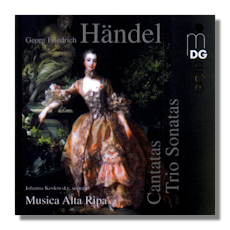
The Internet's Premier Classical Music Source
Related Links
- Handel Reviews
- Latest Reviews
- More Reviews
-
By Composer
-
Collections
DVD & Blu-ray
Books
Concert Reviews
Articles/Interviews
Software
Audio
Search Amazon
Recommended Links
Site News
 CD Review
CD Review
George Frideric Handel

Cantatas & Trios
- Trio Sonata for Recorder, Violin & Continuo in C minor, HWV 386a (Op. 2 #1a)
- Trio Sonata for 2 Violins & Continuo in B Flat Major, HWV 388 (Op. 2 #3)
- Trio Sonata for 2 Violins & Continuo in G minor, HWV 390 (Op. 2 #5)
- Nel dolce dell'oblio, HWV 134 "Pensieri notturni di Filli"
- Dunque sarà pur vero, HWV 110 "Agrippina condotta a morire"
Johanna Koslowsky, soprano
Musica Alta Ripa
Dabringhaus & Grimm MDG3090399-2 63m DDD
With Handel's 250th anniversary being celebrated this year, a crop of recordings are certainly in the pipeline of many musical houses. The most familiar works will definitely get close attention, but other less famous pieces will certainly get a bow as well.
The works on this superb MD&G issue belong to the latter category. The two cantatas on this recording date from Handel's period in Italy (1706-1710) where he wrote most of his more than 70 creations in the genre. Each represent a different style of secular vocal composition from the 17th and 18th centuries, and both differ greatly in the context of the narrative.
"Pensieri notturni di Pilli" draws on the motif of the sleeping Phyllis, a mythical figure who is consumed by love and is eventually transformed into an almond tree. "Agrippina condotta a morire" is based on the history of Imperial Rome during the reign of Nero who is constantly at odds with his mother and who finally decides to put her to death. The cantata concentrates mainly on Agrippina's fate and her changing moods of love, hate and revenge.
The three Trio Sonatas featured on this disc were probably composed around 1718 and in all three, Handel displays his natural genius of articulation and melodic invention albeit only for a handful of instruments. This is a beautifully recorded and annotated addition to the already profuse Handel discography from MDG; immaculately performed and sung by artists who never fail to impress with their committed artistic endeavor.
Copyright © 2009, Gerald Fenech




















